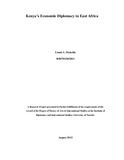| dc.description.abstract | Economic Diplomacy has been an area of interest in developing countries lately.
Several countries have realized the importance of this tool to pursue their economic
interests. The study was focused on Kenya’s economic diplomacy in East Africa.
Kenya is East Africa’s economic hub and has embarked on using this tool to pursue
its economic interests in the region. The newly-elected government of Kenya in
March, 2013 headed by President Uhuru Kenyata has paid special attention to this
important tool of diplomacy as demonstrated in its premier assignments and the study
was specifically interested in this field to explore how the country is using it around
East Africa, to find out any challenges faced and suggest ways of improving the use
of this important device of diplomacy. The research problem was to dig out ways in
which Kenya has managed to maintain individualized trade relations with countries in
East Africa. The main objective of this research was to analyze the trend and use of
economic diplomacy as a modern tool of diplomacy used to market Kenya as a
country. It also focused on establishing the interconnection between Kenya’s
economy and that of the other countries in East Africa. More specifically, the research
was directed towards finding out how Kenya uses economic diplomacy to influence
her relations, the motivating factors behind this new dispensation and establishing any
challenges faced by the country in achieving its objectives. The theoretical framework
established during the research was the theory of Interdependence Liberalism
whereby countries depend on each other on various issues including but not limited to
trade relations, security and for political reasons. The research design was descriptive
research where data was collected through both primary and secondary sources. The
primary data collection methods used was questionnaires administered to respondents
and interview questions too. The respondents were diplomats from the East African
countries; Uganda, Tanzania, Rwanda and Burundi who in one way or another are in
charge Trade Affairs in their embassies, and also civil servants from the ministries of
Trade, East African Integration and Foreign Affairs. Secondary data was obtained
from internal government reports and existing newsletters to support the primary data.
The study established that there was a close link between Kenya’s economy and that
of the other countries in East Africa. It also established that the motivating factors
behind Kenya’s realization of economic diplomacy are export promotion, investment
promotion and involving other stakeholders in the implementation of economic
policies. The challenges highlighted by the study were poor governance and
corruption, lack of strong economic policies, poor infrastructure and fear of
domination from other countries. The researcher recommended that there is need to
streamline policy implementation strategies in Kenya and to eliminate trade barriers
within East African borders to enhance trade in the region. | en |

